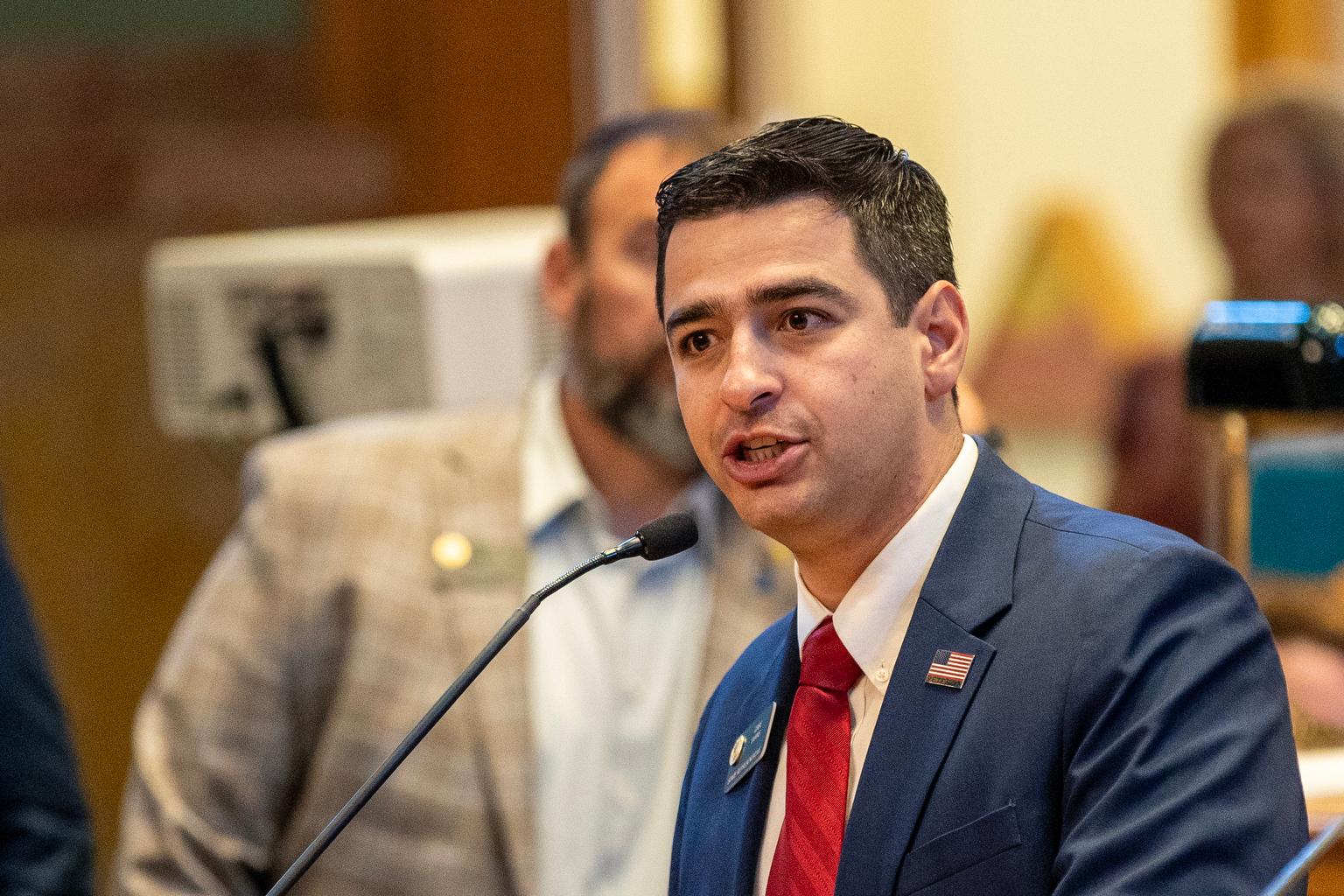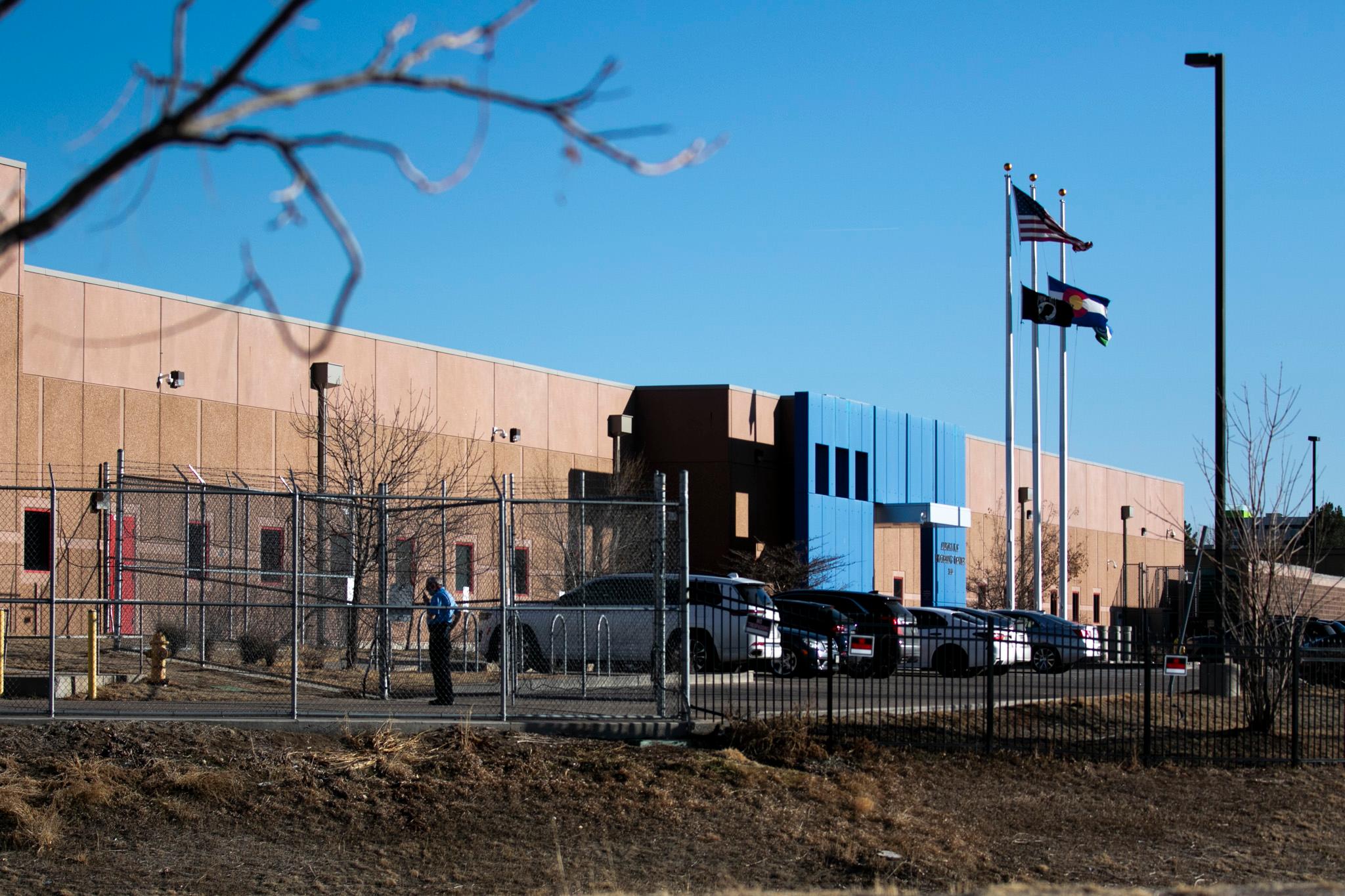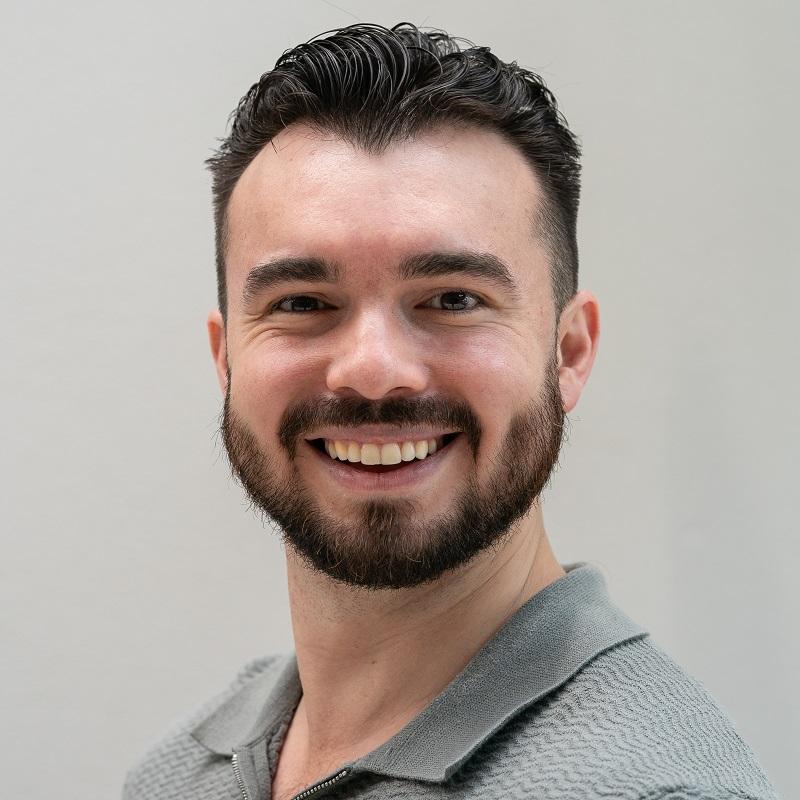
With Republicans controlling both the House and Senate, they’ve looked to make sweeping changes to the federal government. The effort will pivot on the budget.
Rep. Gabe Evans, a Republican, could play a critical role in how the debate plays out. He represents the 8th Congressional District, a swing district he won in November by less than 1 percent, about 2,500 votes. He’s a member of the Energy and Commerce Committee, which is closely involved in the budget process.
Republicans aim to cut taxes significantly. Their budget blueprint would sharply decrease some spending, increase border enforcement and defense funding, and make up to $4.5 trillion in tax cuts.
A key area facing potentially deep cuts is Medicaid, which is a $880 billion-a-year state-federal program. It's a foundational part of the health care system in the U.S., offering health coverage to millions, including seniors, people with disabilities, low-income Americans, pregnant women, adults, and children.
It also plays a central role in funding health care facilities like hospitals, community health centers and clinics, both urban and rural.
Colorado’s Medicaid program is called Health First Colorado. About 1.2 million people, roughly a fifth of the state’s population, according to the agency, depend on it for everything from doctor checkups to preventative care to ER visits.
Twenty-nine percent of Evans’ 8th District, 214,00 people, are enrolled in Medicaid. That’s among the most in any Colorado district, according to the Colorado Department of Health Care Policy and Financing.
If deep Medicaid cuts go through, Colorado could lose as many as 12,000 jobs, $1.3 billion in state economic productivity and $82 million in state and local tax dollars next year. That’s according to a letter Gov. Jared Polis and Lt. Gov. Dianne Primavera sent last week to the members of the state’s Congressional delegation.
Evans, in a statement in response to the letter, accused the governor of misrepresenting the facts.
“I don't support cuts that harm Colorado providers or patients – I support removing waste and fraud. On Polis’ watch, millions in Medicaid dollars have gone to deceased individuals and illegal immigrants,” he said.
In a statement, a spokesperson for the governor disputed Evans’ claims.
“Colorado and the Department of Healthcare Policy and Financing are very aggressive about preventing and pursuing fraud. The fact is that Congressman Evans is using these inaccurate claims as an excuse to turn his back on the 163,002 hardworking Coloradans in his district who rely on Medicaid,” she wrote. “Coloradans hope he reconsiders this dangerous position that would hurt hard working people, health care, and jobs.”
CPR’s health reporter John Daley spoke with Evans about Medicaid in Colorado and in his district.
This interview has been edited for length and clarity.
John Daley: Medicaid covers health care for children, seniors, those with disabilities and pregnant women. It covers almost 30 percent of your district. What are you hearing from constituents about potential deep Medicaid cuts?
Rep. Gabe Evans: Well, I just actually finished up a meeting with a bunch of providers, and so I think that in that space there's really two big things that need to be discussed. First is that there's a ton of fraud, waste, and abuse that's in the system right now. You can go look at the government accounting offices numbers. They estimate $31 billion a year. And so there's a lot of ways that we need to clean up this program to do exactly what you said, which is to protect those most vulnerable individuals. I have a kid who’s got some medical necessities and medical complexities, and so making sure that we're protecting this program for our most vulnerable by cutting out a lot of that fraud, waste and abuse — that actually drives up health care costs and limits access to it and comes with a reduced health care outcomes — that's the main goal.
(Reporter’s note: Evan’s office declined to give specifics about his child’s health.)
Daley: Isn't whatever waste, fraud and abuse that's been found just a small percentage of the overall spending on the program in Colorado?
Evans: Again, go look at the GAO, not my numbers, it's GAO’s numbers, government accounting office. They say it's 31 billion a year. That's an annual cost. There is a significant amount of streamlining that we can do that does not impact benefits for lawful beneficiaries that strengthens the program.
So we're discussing things like not even getting rid of that, but shrinking that down to 30 days and saying that if you're going to run up a tab on Medicaid, you at least need to be a lawful beneficiary of the program.
Daley: Are you saying that no Medicaid enrollees who are legitimately enrolled in a program in your district will lose their care as a result of cuts that the Congress is considering?
Evans: Well, remember, this program is administered by the state of Colorado, which has done a horrible job of administering it. So Congress is working to be a good steward of taxpayer money so that we can preserve the resources for those people who critically need it, but we need the state to be a good partner with us too, because the ones that actually administer the program. And so a lot of the discussion is going to be from the federal level, how do we make sure that we're being good stewards of the taxpayer money, but we're putting appropriate guardrails around the program so that states like Colorado have to actually also be good stewards of the taxpayer money so that we can, again preserve these resources for the people that critically need it.
Daley: A group called the Colorado Health Policy Coalition, it's a coalition of 80 plus organizations, recently sent a letter to you and every member of the delegation. It said Medicaid cuts will hurt Colorado's economy and trigger job losses in each district, including yours. What economic impact do you think Medicaid cuts will have on your district?
Evans: I was in a provider's office an hour ago talking about this and talked about what are some of the things that are being discussed, some of the actual policies, what are the things that are being discussed in this space? Their comment to me was they actually feel relieved knowing that these potential policies that we're going to discuss when we get back on Monday are again going to be aimed at making the program viable by cutting out the fraud, waste and abuse so that providers like them can actually function in this space. And we talked through several of these policy things, and I think they actually left that meeting feeling more reassured rather than worried.
Daley: Can you tell me a little more about the meeting? Where were you meeting and what was the group you were talking to?
Evans: It was one of the big providers in the central area of the district. So they do a lot of integrated care, general practice, primary care, physician work.
Daley: Others warn that Medicaid cuts could gut health care and have a huge impact on rural hospitals and nursing homes. Potentially they operate on such narrow margins that maybe it could cause some to close. You grew up in Colorado, your district is agricultural, you own and operate a family farm. Are you worried about rural hospitals and clinics
Evans: Oh, I'm very worried about rural hospitals and clinics, but it's because of the overregulation and all of the red tape that the state has imposed on them because if we're going to be honest about Medicaid, and the providers I just met with brought it up, most providers lose money on every Medicaid patient that they take. And so in order to stay in business, Medicaid patients are actually generally subsidized by the providers that have to balance their own ledgers. They're subsidized by patients that have private insurance.
And so having a healthy ecosystem in the whole health care space is critical to protecting our most vulnerable and to the folks that are on Medicaid. And unfortunately, what we've seen in Colorado, particularly in the areas that you mentioned, small towns, rural areas, is the incredibly heavy regulatory burden from the state of Colorado has actually driven out private insurers. And when those private insurers leave, then that has an incredibly negative impact, particularly in those rural areas because again, the Medicaid program right now, it doesn't half the time, it doesn't even compensate providers at the break even point.
And so again, we’re going back to cutting out the fraud, waste and abuse that actually preserves the program by making sure that we can get more resources to the people who are actually lawful beneficiaries of it. And we're making sure that I have another bill in this space, Medicaid and Medicare Fraud Prevention Act. We're doing just common sense things like removing dead doctors, their provider number from the program. So that number isn't out there as a potential target for fraudsters who would use that to be able to write fraudulent prescriptions or otherwise take advantage of the program.
Daley: Last week Rep. Jeff Hurd signed a letter with a group of lawmakers urging fellow Republicans in the leadership of the U.S. House of Representatives to preserve and strengthen Medicaid. Here's a quote from their letter. “We cannot and will not support a final reconciliation bill that includes any reduction in Medicaid coverage for vulnerable populations.” You did not sign the letter. Why not?
Evans: So if you go look at that letter, actually nobody from the Energy and Commerce Committee Republicans signed onto that letter. Energy and Commerce, of course, is the committee that has jurisdiction over Medicaid. And I think that's because those of us that sit on the Energy and Commerce Committee have that assurance, having seen some of the proposals that we're going to be able to meet that reconciliation number without impacting benefits to lawful beneficiaries of the program, as long as states like Colorado actually work hand in hand with us in order to implement these efficiencies that protect and preserve taxpayer resources for our most vulnerable.
Daley: So Hurd and the other 11 who signed that letter are wrong?
Evans: Well, they don't sit on the committee that has jurisdiction over Medicaid. So I don't know that the same way that I don't know the detailed discussions that are happening on committees that I don't sit on, I don't know if they have the same level of insight that I have, being a member of the committee with jurisdiction.
Daley: There's been talk of changes to Medicaid. As the budget process plays out, would you support some of the things that have been discussed, work requirements, block grants? There's been discussion of scaling back the percentage of Medicaid the federal government covers, so states would have to cover more.
Evans: So there's a lot of different policy questions that you asked in there, and as I've learned in my 110 days or so in Congress, and then also being a state legislator before it, the devil's in the details. And so that means being able to socialize these policies with the actual stakeholders to make sure that we're able to achieve the goal of being a good steward of taxpayer resources so that we can preserve the program for the most vulnerable.
That all boils down to a very detailed policy conversation. So without a specific policy proposal, it's kind of difficult for me to broadly answer that question. But yeah, the overall goal is to be able to protect the program by cutting out the fraud, waste and abuse. The traditional Medicaid population — pregnant women, people with disabilities, kids — is currently subsidized at a 1:1 ratio, one federal dollar for one state dollar. In 2014, there was what's called the expansion population. So those are able-bodied workers. They're subsidized at nine federal dollars per one state dollar. And so again, having conversations in these spaces to figure out how to be good stewards of taxpayer resources and protect our most vulnerable is the ultimate goal.
Daley: The Medicaid expansion population, do you think they deserve health care too? Wouldn't they be some of the people who might lose health care as a result of potential cuts?
Evans: Of course, they deserve health care. The expansion population, of course they deserve coverage. But again, being good stewards of the taxpayer money means how do we make sure that are most vulnerable to people that you led with pregnant women, kids, people with disabilities, how do we make sure that they're getting their fair share of the pie and their fair share of taxpayer resources when the expansion population is again subsidized at nine federal dollars for everyone state dollars compared to here in Colorado, a one federal dollar for one state dollar for pregnant women, kids, and people with disabilities.
Daley: Back to the discussion we were having about hospitals. I've been talking to rural hospitals and they have told me that their margins are so tight and this is true community health centers, things like that, that if they lose a significant portion of Medicaid funding that could force them to close their doors and if they were to lose some of the funding they get through the expansion population you were just talking about, wouldn't that put them potentially at risk of not being able to stay open?
Evans: I talked to my rural hospitals too. Some of them are actually operating in the red, and that's before we've done anything with Medicaid. And again, a lot of that ties back to the regulatory burden that's being imposed on them by the state of Colorado, which actually administers this program. When I have this conversations with my hospitals, I usually ask them, how much of a cost savings can we provide to you so that we can actually get the funding for your hospital back into the positive revenue space through just some common sense reforms and cutting of all of the bureaucratic red tape that's stifling our small hospitals. And typically when we engage in that conversation, it is a long laundry list of just heavy and at times outright punitive regulations that our rural hospitals are struggling with, where if we can streamline that regulatory system and allow them to actually focus on being providers, taking care of their patients rather than paper battles with the state paperwork battles with the state, we're going to be able to do a lot of good for our rural hospitals.
Daley: Do you support deep cuts to research at Colorado State or CU Anschutz and wouldn't that also have a big impact on the economy that a lot of folks are really worried about right now?
Evans: So in the research space, again, I got a kid with some medical complexities, so we've taken advantage of a lot of the just really advanced medical research that's going on.
And so making sure that we preserve and protect that research and the lifesaving medications and techniques that come from it is critically important. But again, whenever we talk about this, there's two sides to every coin, which is how much regulatory burden and how many hoops do these research entities have to jump through in order to be able to provide that life-saving research? And so you have to be able to talk about both things at the same time, because at the end of the day, the goal is for vulnerable families, for people with kiddos like mine with medical complexities, we have to make sure that we are protecting these programs.
We have to make sure that we're being good stewards of taxpayer dollars. And if we're able to do the work that we need to do in those spaces in partnership with the states, which actually administer the program, feds write the check, the states administer the program, we are going to be able to preserve and protect the Medicaid for our most critical members, the most critical, our most vulnerable members in society by being good stewards of the taxpayer money
Daley: So in your view, both with research and with Medicaid, it's possible to root out waste, fraud and abuse and at the same time not have major cuts?
Evans: In working, again, in partnership with the state who's the day-to-day administrator of all of these programs.
Daley: But the research money comes straight from federal sources, like NIH and other agencies to research institutions like CSU and CU Anschutz. Right? Not without the state, doesn't it?
Evans: Correct. The state still sets the regulatory environment in which research institutions like UCHealth or Anschutz have to operate.
- Caught between state and federal budget cuts, Colorado local governments fear for future of vital programs
- Federal Medicaid cuts would put Colorado in a “huge vise” says treasurer Dave Young
- Deep Medicaid/SNAP cuts would cost Colorado’s economy 14,000 jobs next year, according to new report
- House Democrats officially set their sights on Gabe Evans’ seat









